The Baptism Wheel
There is one body and one Spirit, just as also you were called in one hope of your calling; one Lord, one faith, one baptism, one God and Father of all who is over all and through all and in all.
- Ephesians 4:4-6
In his effort to encourage the Ephesians church to strive for unity and peace in the Spirit, Paul reminds them of what this unity is based upon:
- They equally share the body of Christ in the present.
- They share a similar past which was their calling to Christ through the gospel.
- They share a similar future or hope of heaven.
Paul also mentions that they all have together confessed the same Lord, believed the same teaching (the faith), and received or experienced the same (one) baptism. We can understand that the one Lord is Jesus and the one faith is the teaching about Jesus as the Son of God who died on the cross for our sins and was resurrected on the third day, but why would Paul (or the Holy Spirit for that matter) insist on including baptism in this equation? I believe that the one baptism reference was included because at that time there were many baptisms, as well as many reasons for baptism. In this lesson, therefore, I'd like to define the one biblical baptism that Paul is talking about here and the many purposes that the New Testament gives for its administration.
One Baptism
By the time someone who is reading the Bible gets to the Book of Acts chapter 2 and reads about Peter's Pentecost Sunday sermon and the tremendous response (when 3,000 people came forward and were baptized) that person has read about several types of baptisms and water rituals. These were present not only among the Jews but pagan people as well. There were many forms of baptism at the time that the book of Acts was written. For example:
1. The Pagan Religions
Pagans ceremonially purified themselves with fire, incense and with blood. But their most common purification ritual was with water. For example, water purification was required by those who were initiated into the mysteries of Isis, the Egyptian female goddess of nature and magic. The Greeks had special priests called the Karthartai who specialized in water purification rites. Baptism or immersion in water, therefore, as a symbol of purification was not exclusively a Jewish or Christian practice, it was used by pagans as well at that time.
2. Jews
The Jews also had the practice of ritual washings in their religious system. They, however, had been using water in their purification rites for at least fifteen hundred years before Christ. There was, for example, the ceremonial washing commanded by God of Aaron and his sons before they put on the sacred garments of the priesthood in order to prepare for their priestly duties (Leviticus 8:5-7). There were also various forms of ritual washings or ablutions for the people. This was required in situations where a person was rendered ceremonially impure. Jewish men, for example, were subject to water purification if they had come into physical contact with a woman during her menstrual cycle. Only after this was accomplished could they return to temple worship (Leviticus 15:27). In addition to these, new converts to Judaism had to be circumcised, baptized in water and offer sacrifice in order to complete their conversion process to the Jewish faith.
3. The New Testament
In the New Testament, there are several references to the ceremonial washing of hands and utensils by the Pharisees (Mark 7:4). So the Jewish people of Jesus's day (as well as pagans) were familiar with water purification rituals of various kinds.
4. John the Baptist
John the Baptist is unique among the prophets for several reasons. He broke the silence that had existed for four centuries since the time of Malachi, the previous prophet through whom God spoke. He was also the last of the Old Testament prophets arriving before the New Covenant was established by Christ. He was chosen to be the one who proclaimed that the long awaited Messiah, who was spoken of in the past by other prophets, was finally here. The other prophets said that one day in the future the Messiah would come. However, when John the Baptist appeared, he announced that the Messiah's arrival was imminent.
Aside from the water baptism that he called on people to receive, John spoke of yet another baptism that was to come, the baptism with the Spirit that the Messiah would administer when He appeared,
As for me I baptize you with water for repentance, but He who is coming after me is mightier than I, and I am not fit to remove his sandals. He will baptize you with the Holy Spirit and Fire.
- Matthew 3:11
So, as a prophet, John was signaling that the promises made by the earlier prophets like Joel (Joel 2:28-32) who said that one of the things which would accompany the arrival of the Messiah was a greater manifestation of the Holy Spirit's presence and power, was soon to be fulfilled.
In previous times the Holy Spirit would empower select individuals like prophets, kings and judges with certain abilities and power to do God's work (Judges 3:10; Isaiah 61:1; Ezekiel 2:2). The promise of the prophets was that when the Messiah would come, not only a precious few would have the Spirit for a short amount of time to render special service, but everyone would receive the Spirit of God and have Him all of the time. Some would be empowered with special gifts to do signs and wonders as in previous times, but the good news was that with the arrival of the Messiah, everyone would receive the Spirit and the Spirit would stay within them forever.
When we read Acts 2:38 ("Repent, and each of you be baptized in the name of Jesus Christ for the forgiveness of your sins; and you will receive the gift of the Holy Spirit"), we usually concentrate on the baptism part of this verse because in our day there has been much debate about the subject of baptism. However, the people who were actually hearing the message of Peter (who had no such issues with the ritual of baptism) were more focused on the news that the promise of the prophets, that one day they would all equally receive the Spirit, was about to be fulfilled. Peter even explains that the miracle of tongues that he and the other Apostles were then performing was actually a fulfillment of those promises made previously about the Spirit. As we read Acts we see these prophecies fulfilled in two ways. First, the people who responded to Peter's preaching received the indwelling of the Spirit, and then, as previously mentioned, the Apostles and many disciples received empowerment through the Holy Spirit to perform miracles in the service of the Gospel. In the following chapters we also read about disciples on whom the Apostles laid hands performing all kinds of miraculous signs and wonders (Acts 2:43; Acts 3:7-11; Acts 8:17; Acts 19:6) thus fulfilling both parts of the promise concerning the pouring out of the Spirit on all believers.
John the Baptist's preaching, therefore, was important in alerting the people to not only expect the imminent arrival of the Messiah but also a clarification concerning what the Messiah would bring, forgiveness for sin and the personal possession of the Spirit of God for all who believed and were baptized.
With these things in mind this would be a good point to note several things about the form of baptism. Throughout history there has been a debate about the mode of baptism. Three forms have been practiced:
- Immersion in water
- Pouring with water (water poured over the head of the individual)
- Sprinkling with water (usually babies are sprinkled with water)
Each of these methods have a specific Greek word (because Greek is the language in which the New Testament was first written) used to describe them. For example:
- To pour - "Ekcheo" means to pour out.
- To sprinkle - "Raino" means to sprinkle.
- "Baptizo" - means to immerse or to submerge.
There is, therefore, a word in the Greek language that specifically represents each different type of baptism that has been practiced. One thing to note is that when the New Testament mentions the word 'baptism' it is simply transliterating the Greek word "Baptizo" into the English word "Baptize." The point in all of this is that if you were to literally translate John the Baptist's name, you would call him "John the Immerser" not "John the Pourer" or "John the Sprinkler" because the New Testament writers did not use these Greek words to describe him. They used the word "Baptizo". So, whenever Jesus or the Apostles called on their audience to respond to their message they would encourage them to repent and be immersed in the name of Jesus Christ because the word they used meant to immerse someone in water.
Therefore, if you were present in Jerusalem on Pentecost Sunday you would have witnessed 3,000 people being immersed in the large pools of water that were present near the Pilgrim gate where Peter preached his sermon. Some people might say, "Well, why doesn't the Bible use the word immerse?" The reason the translators transliterated the word "Baptizo" instead of translating it into the word "immersion" in their various versions is because they did not want to offend the many religious denominations that had been using sprinkling and pouring as their mode of baptism for many years, and whose support they needed to distribute their version of the Bible when it was finally printed. Some newer translations, however, (i.e. International English Bible) now actually translate the Greek word "Baptizo" into the correct English word using the word "immerse". Hopefully this brief review of the debate about the form of baptism, which was transformed from immersion in New Testament times to other modes throughout the years, has clarified this issue for you.
5. The Baptism of Jesus
At the start of His ministry, Jesus paralleled John's ministry (similar message and response), however, after John was executed John's disciples followed Jesus as John had instructed them. Jesus followed the form of John's ministry in that He preached and immersed those who responded. However, the content and the authority of His message was different: He preached that the Kingdom and the Messiah were here and those who wanted into the kingdom needed to be baptized. After His crucifixion and resurrection He then charged His Apostles to continue this ministry and do so with the backing of his full authority (Matthew 28:18). When, therefore, He tells them go out and make disciples baptizing them in the name of the Father, Son, and Holy Spirit, He is saying in effect that He has the the full authority of the Godhead to send them out on this mission. The fullness of the message was now going to be preached: forgiveness of sin, empowerment and full indwelling of the Holy Spirit, membership into the kingdom or into the church, and eternal life. All of these were offered to those who believed in Him and expressed that belief in repentance and full immersion (baptism) in water (John 3:16; Acts 2:37-42).
All of this to say the following: When Paul the Apostle referred to the one baptism in Ephesians 4:5 he was confirming, through inspired writing, that despite the fact that his readers may have been aware of the many baptisms we have discussed here so far, there now remained only one baptism authorized by God, given by Jesus, preached by the Apostles and recorded in the New Testament. That baptism was full immersion in water done to express a person's sincere repentance and belief that Jesus Christ was the Son of God. This was the baptism that led to forgiveness of all sins, reception of the Holy Spirit and the granting of eternal life.
The Baptism Wheel
I'm always amazed when I hear someone ask if baptism is necessary for salvation or if a person has to be baptized in order to become a Christian. Based on what we have seen from the Bible so far, the answer to that question is a resounding, "yes!" John the Baptist, Jesus and then the Apostles all preached the necessity of baptism in the process of salvation, otherwise what would be the purpose of it? In the New Testament, baptism (or immersion in water) to express one's faith is always connected to salvation, however, in the passages where baptism appears the idea of salvation is described using different words and images. I have found that an effective way to convey this pattern of teaching is to use what I call The Baptism Wheel.
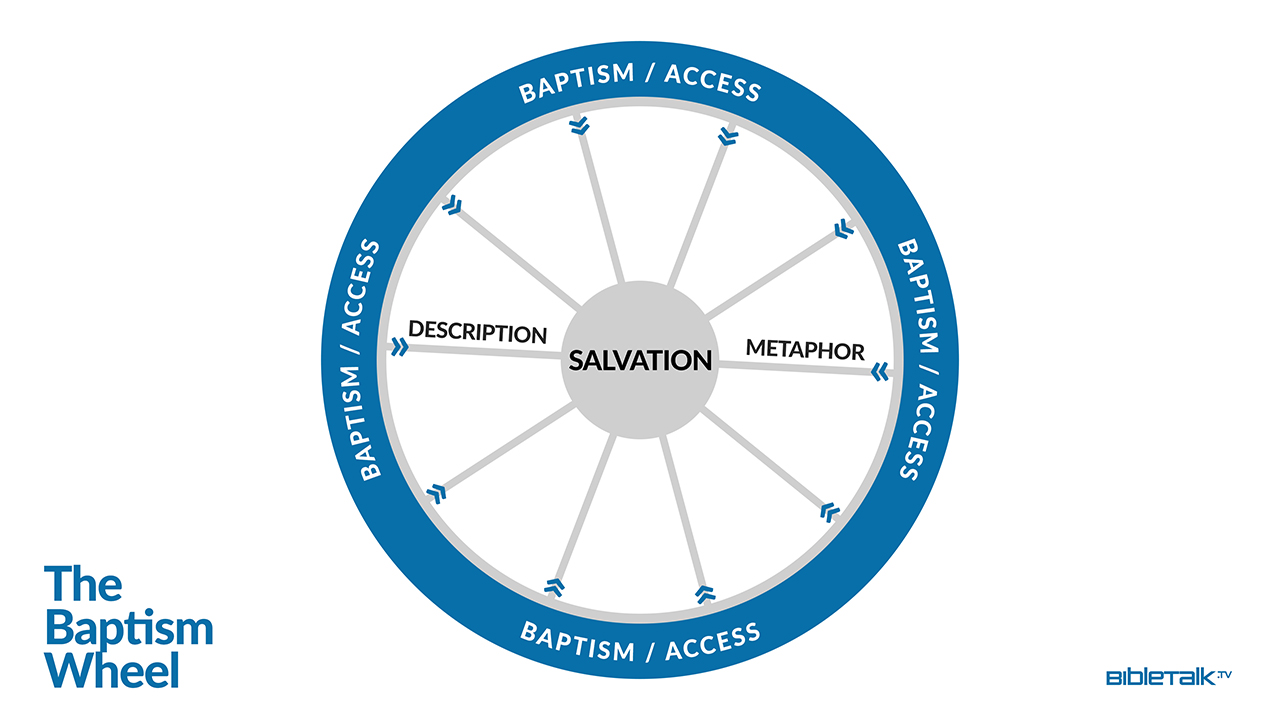
Let me explain the meaning of the graphics presented here. At the center of the wheel is a circle representing the idea of salvation, our ultimate goal. The spokes are the various terms found in the Bible that describe salvation. The blue part is the action of baptism itself. It is the access point that everyone must go through in order to arrive at salvation. I will list ten passages from the New Testament that, in context, are directly referring to salvation. However, each uses different terms or images to describe this same salvation. The language and images will all be different except that in each passage, baptism will be the one thing they all have in common. In other words, each passage describes salvation in a different way but will always connect it to the action of immersion in water.
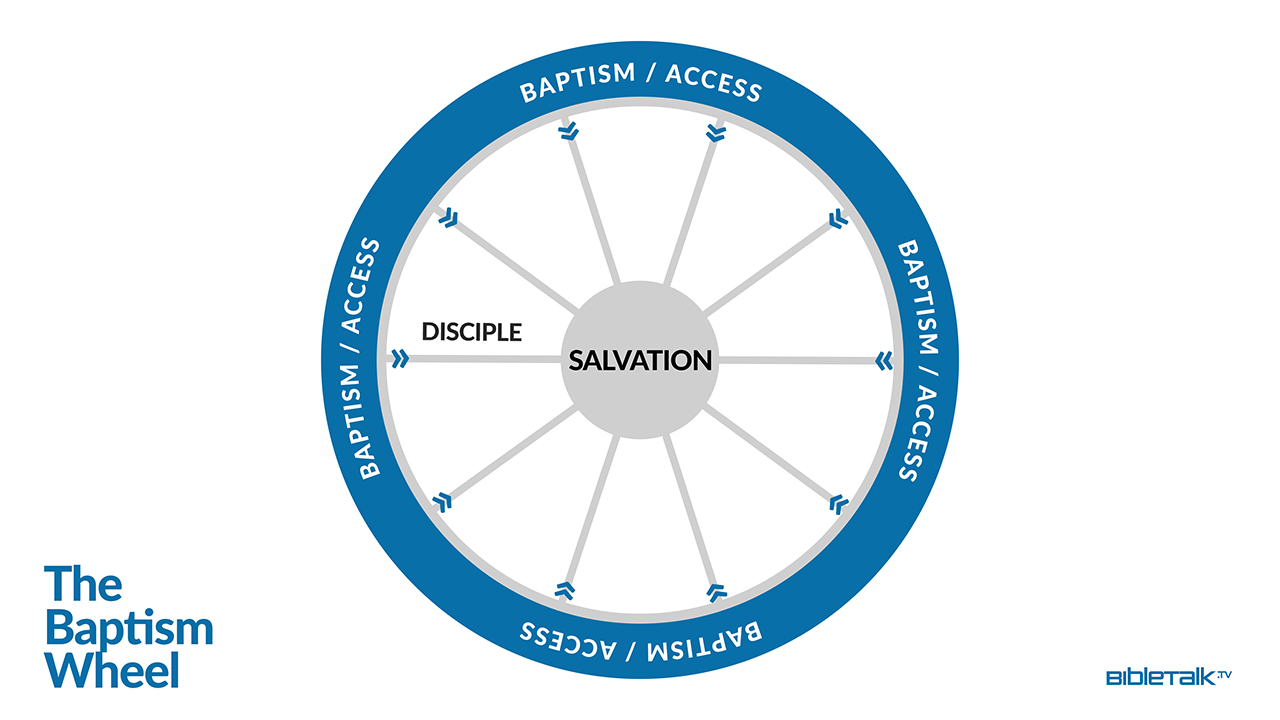
1. Disciple
18And Jesus came up and spoke to them, saying, "All authority has been given to Me in heaven and on earth. 19Go therefore and make disciples of all the nations, baptizing them in the name of the Father and the Son and the Holy Spirit, 20teaching them to observe all that I commanded you; and lo, I am with you always, even to the end of the age."
- Matthew 28:18-20
How is salvation described here? Jesus describes it as becoming a disciple because only disciples are saved, are they not? Can you be a disciple and not be saved? Of course not, so salvation in Matthew 28 is described in terms of becoming a disciple of Jesus. Those who become disciples are saved.
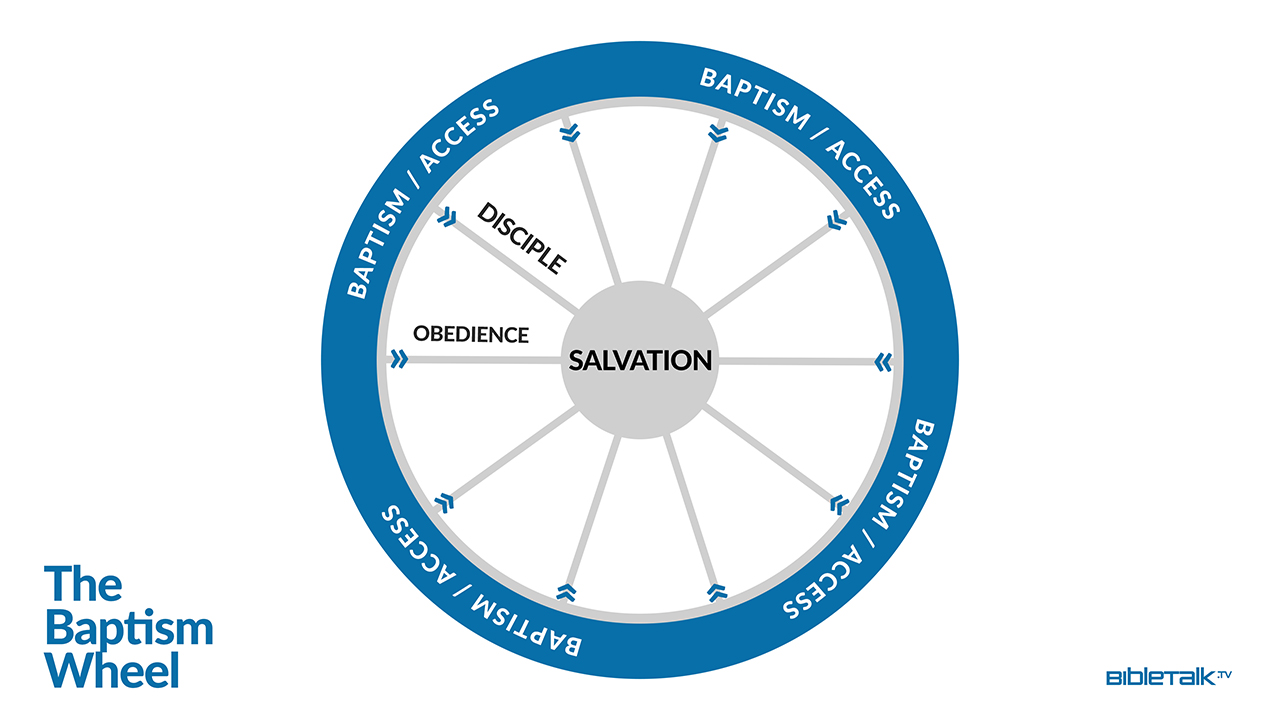
2. Obedience
He who has believed and has been baptized shall be saved; but he who has disbelieved shall be condemned.
- Mark 16:16
Salvation in Mark 16:16 is described in terms of obedience because here Jesus issues a command. This means that those who obey the command to believe and be baptized will be saved and those who disobey it will be lost. Salvation, therefore, is framed in terms of obedience to a command. Who are the saved? The ones who obey Jesus' command to believe and be baptized.
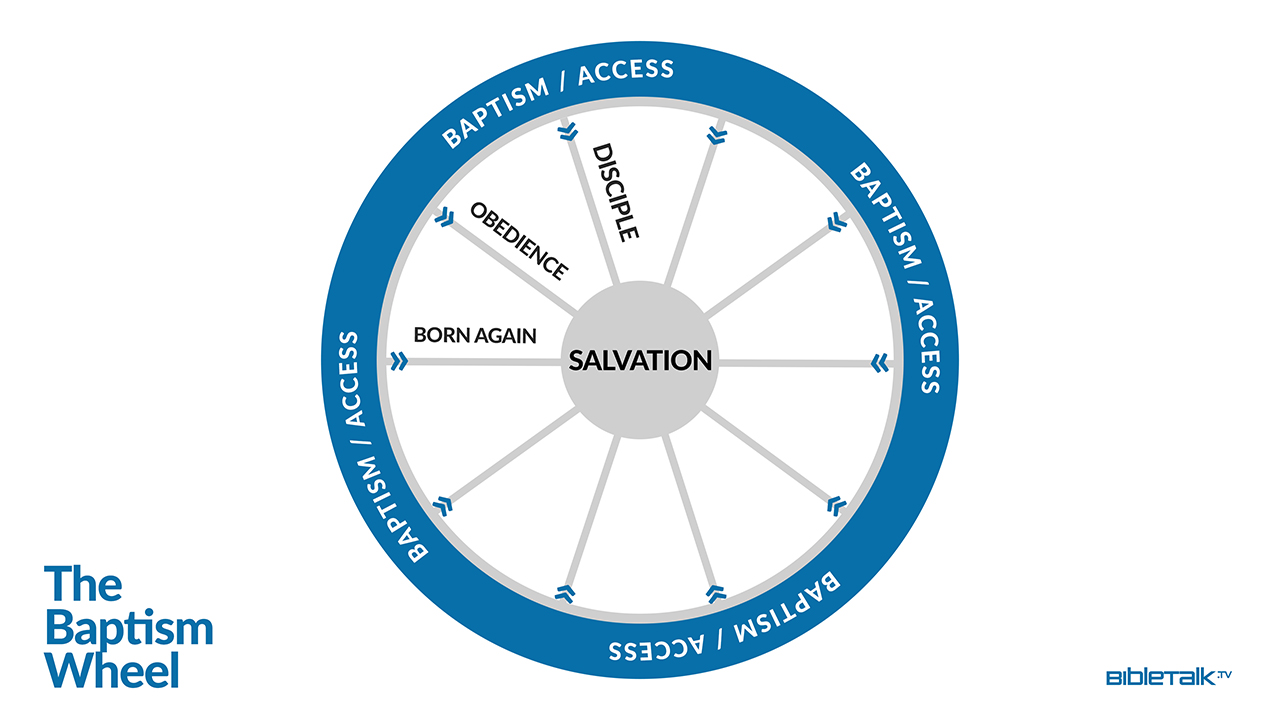
3. Born Again
3Jesus answered and said to him, "Truly, truly, I say to you, unless one is born again he cannot see the kingdom of God." 4Nicodemus said to Him, "How can a man be born when he is old? He cannot enter a second time into his mother's womb and be born, can he?" 5Jesus answered, "Truly, truly, I say to you, unless one is born of water and the Spirit he cannot enter into the kingdom of God.
- John 3:3-5
In this familiar passage the Lord is describing salvation as a "born again" experience. Who are the saved? The ones who are "born again" by the water and the Spirit. What water? The water of baptism. What Spirit? The Spirit received at baptism.
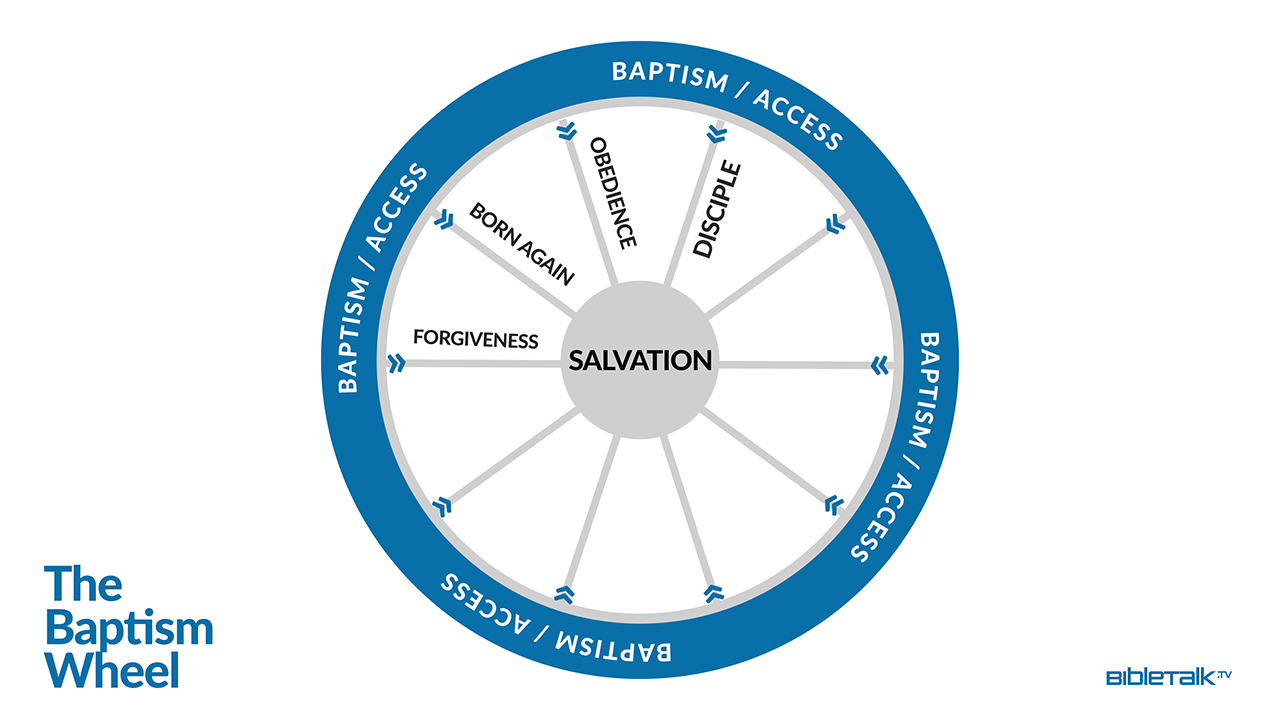
4. Forgiveness
Peter said to them repent and let each of you be baptized in the name of Jesus Christ for the forgiveness of sin.
- Acts 2:38a
How is salvation described here? Peter describes it as belonging to those whose sins are forgiven. After all, if your sins are not forgiven, can you possibly be saved? Of course not. So in Acts 2:38a, the Bible describes salvation in terms of forgiveness of one's sins. It doesn't mention the word salvation, it refers to it as the state of forgiveness.
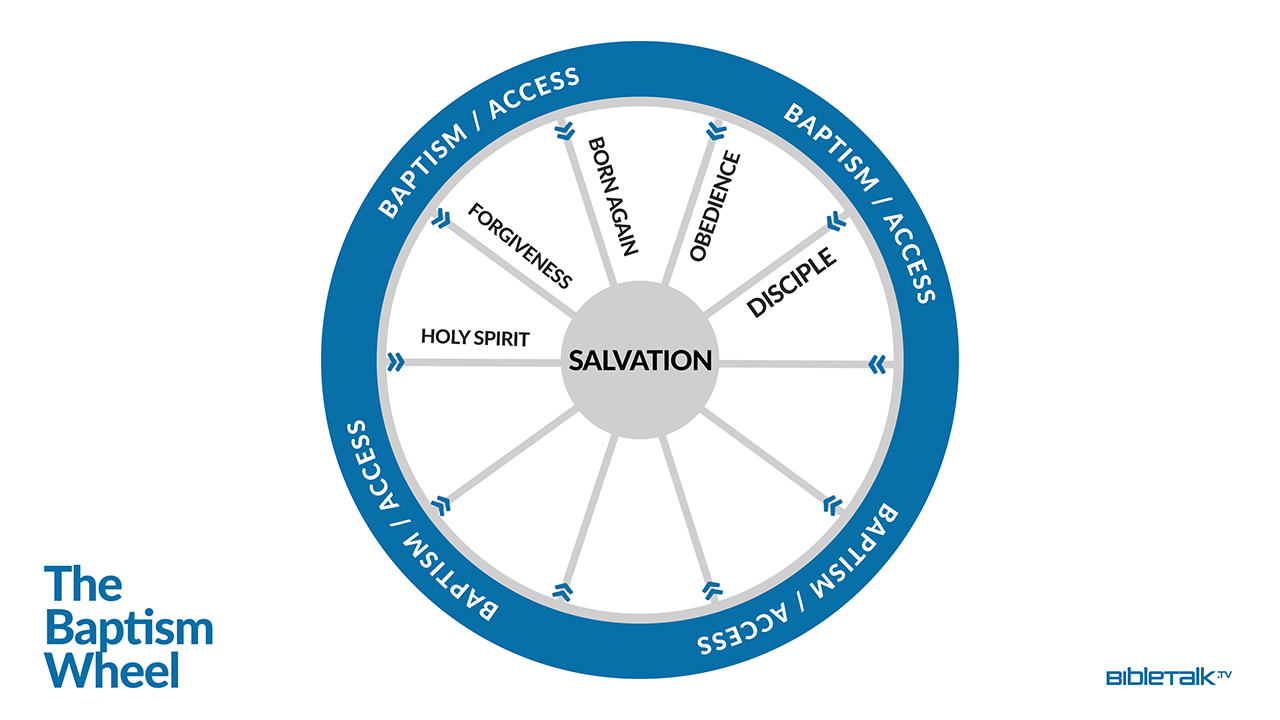
5. Holy Spirit
and you will receive the gift of the Holy Spirit.
- Acts 2:38b
In the same passage Peter describes salvation in yet a different way by saying that those who have their sins forgiven also receive the indwelling of the Holy Spirit. In this instance who are the saved? They are the ones who have the Holy Spirit within them.
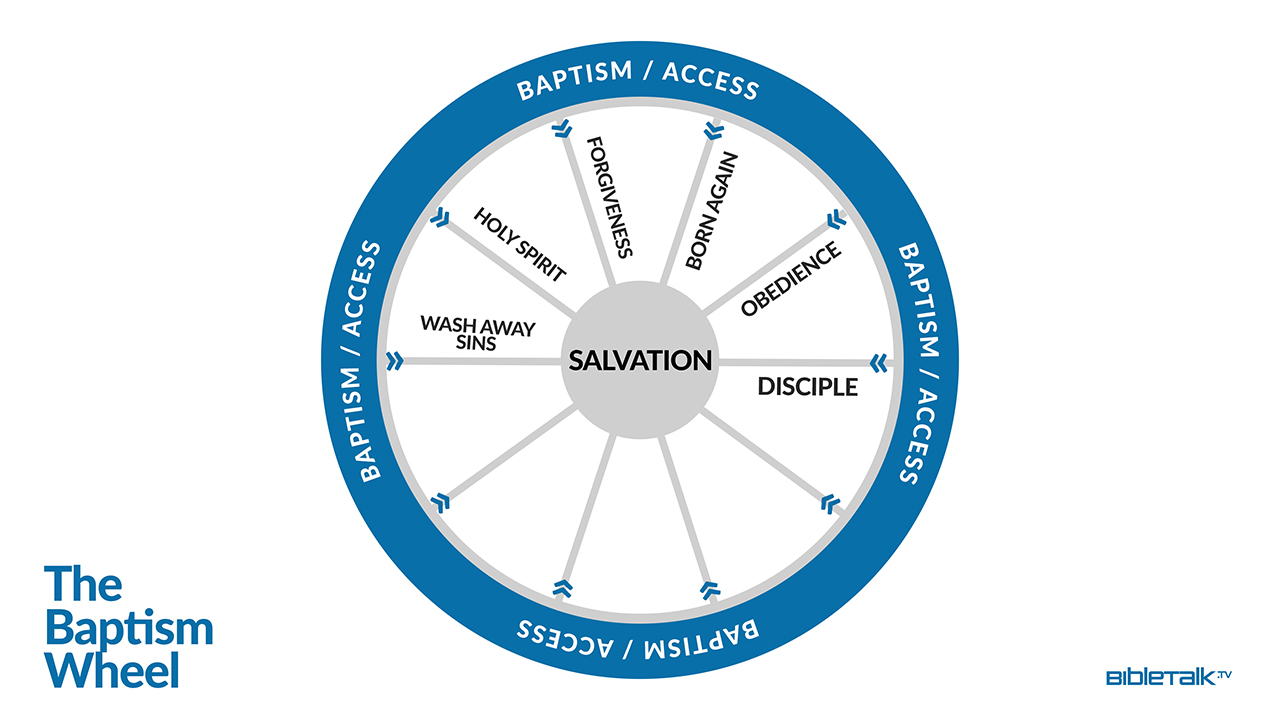
6. Wash Away Sins
Now why do you delay? Get up and be baptized, and wash away your sins, calling on His name.'
- Acts 22:16
In this verse salvation is once again described as a removal of sin. Who are the saved? The ones who have had their sins washed away. When are one's sins washed away? When one is baptized.
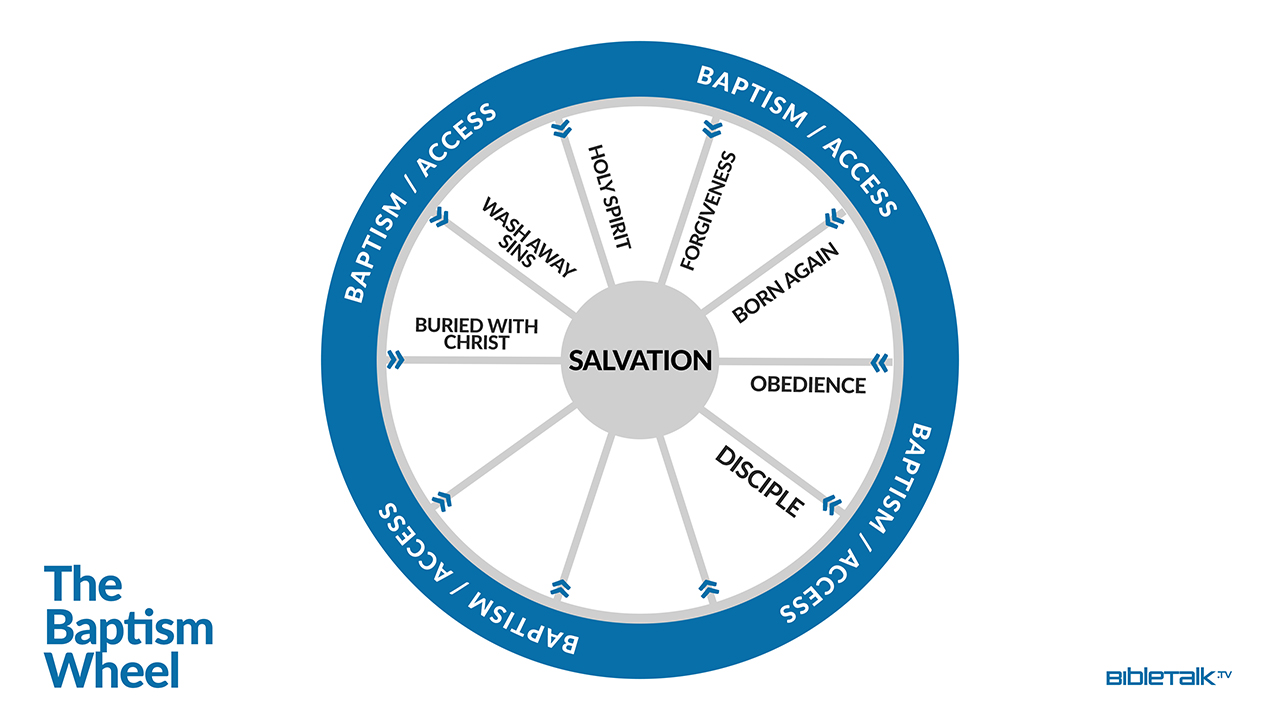
7. Buried with Christ
3Or do you not know that all of us who have been baptized into Christ Jesus have been baptized into His death? 4Therefore we have been buried with Him through baptism into death, so that as Christ was raised from the dead through the glory of the Father, so we too might walk in newness of life.
- Romans 6:3-4
Who are the saved? Those who have been buried with Christ and resurrected with Christ. Can you be buried and resurrected with Christ and still be lost? Of course not. How are you buried with Christ? In the waters of baptism.
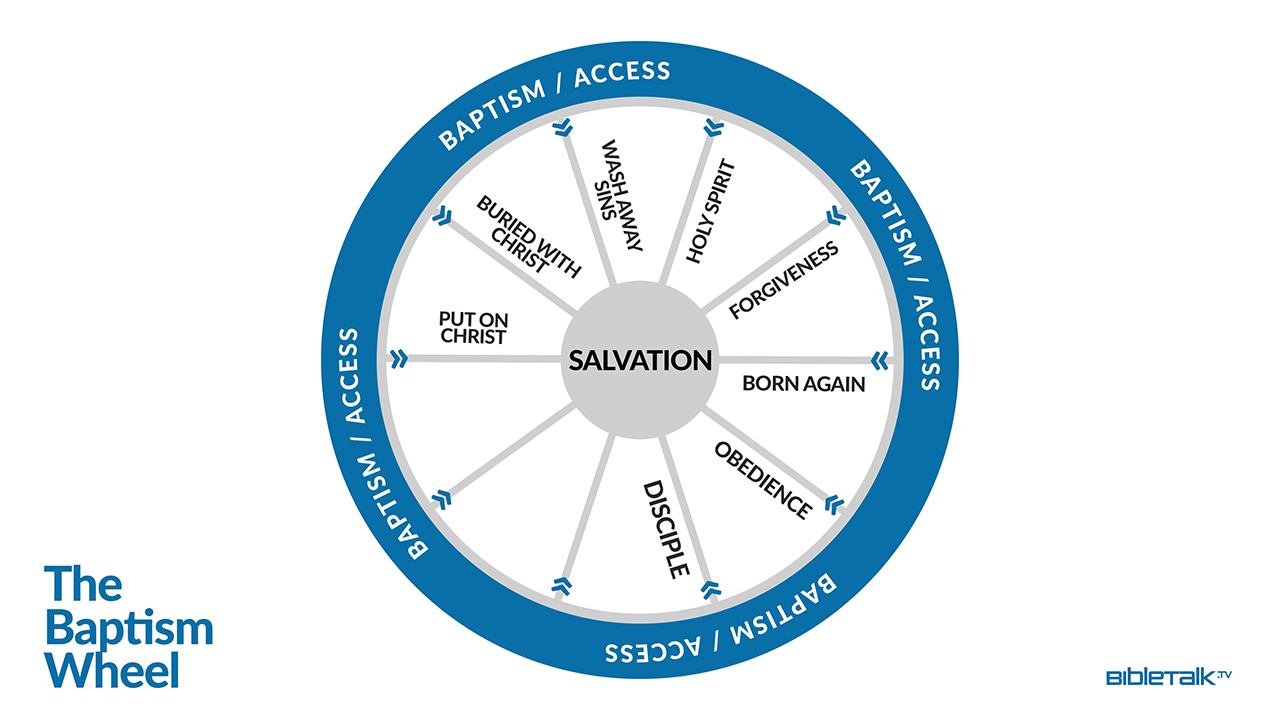
8. Put on Christ
For all of you who were baptized into Christ have clothed yourselves with Christ.
- Galatians 3:27
How is salvation referred to here? It is described as "putting on Christ." Notice that Paul does not mention the word salvation. This is a metaphor, it is an image, it is a description but it always means the same thing. It is always talking about salvation. So how does Paul describe it in Galatians 3:26-27? He describes salvation as "putting on Christ." Who are the saved? They are the ones who put on Christ. Where did they put on Christ? In baptism.
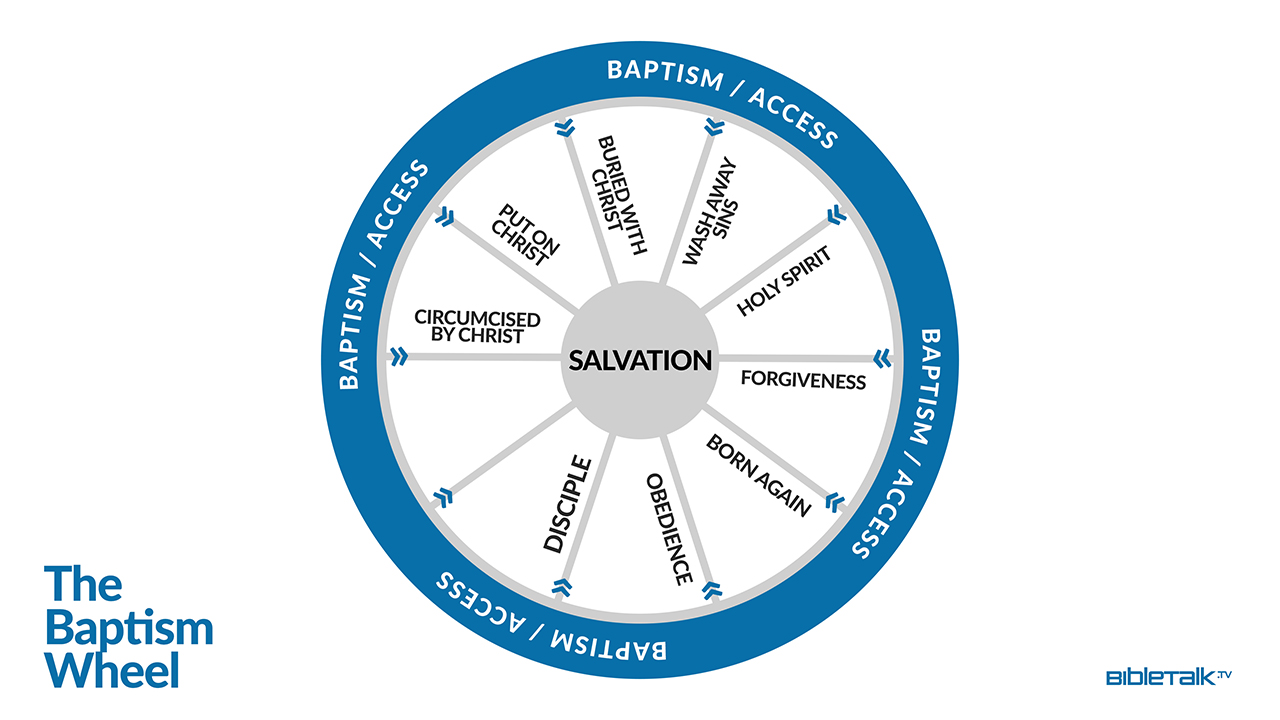
9. Circumcised by Christ
11and in Him you were also circumcised with a circumcision made without hands, in the removal of the body of the flesh by the circumcision of Christ; 12having been buried with Him in baptism, in which you were also raised up with Him through faith in the working of God, who raised Him from the dead.
- Colossians 2:11-12
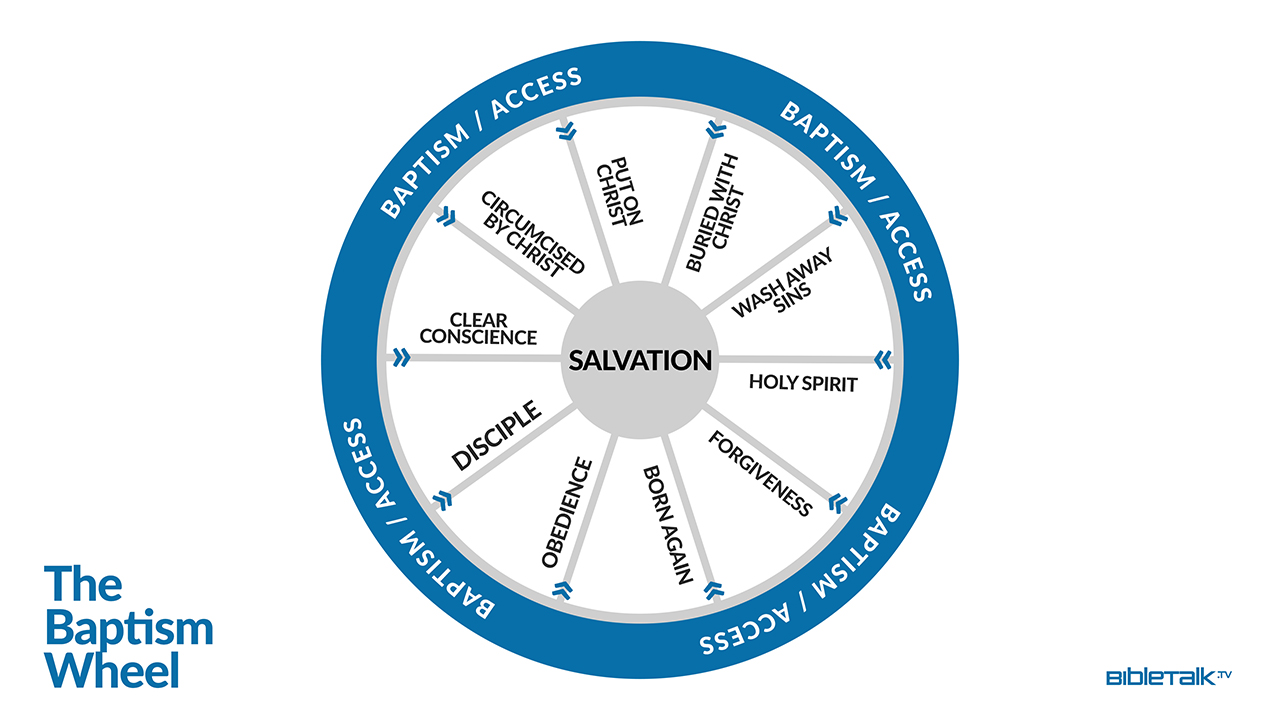
10. Clear Conscience
Corresponding to that, baptism now saves you—not the removal of dirt from the flesh, but an appeal to God for a good conscience—through the resurrection of Jesus Christ,
- I Peter 3:21
So who are the saved according to Peter in this passage? The saved are the ones that have a clear conscience before God. And where is that conscience cleared? In the waters of baptism.
Conclusions
Let us draw a few conclusions here based on the ten Scriptures we have examined. Realize that in the Bible one passage is enough to make a point and two passages that support the same idea are usually sufficient to confirm it. We have just read ten passages in support of the same idea!
A. Baptism is a key part in the process of salvation
I like to say "process of salvation" because salvation is a process. God began it in Genesis by promising salvation to mankind after the fall of Adam (Genesis 3:15), and kept the promise alive throughout the Old Testament period through a variety of servants and prophets. He fulfilled His promise of salvation by sending Jesus the Messiah to die on the cross and raised Him from the dead. This resurrection, the salvation it purchased and the way mankind can receive it was announced to the world by the Apostles through their preaching of the gospel which has been preserved in the Bible and faithfully handed down through the generations until it has come to us today. This is the process of which I speak.
In this lesson, therefore, I have cited ten Scripture references that deal specifically with this salvation and have pointed out that in every single passage baptism is central to the process. This is called biblical context where the conclusion comes naturally from the passage itself without the need of forced interpretation. We know that it is the sacrifice of Jesus on the cross that pays for our sins (Isaiah 53:4-5; I Peter 2:24), not the act of baptism. However, God has given us baptism as the common physical expression of our faith. It is through baptism that we confess our belief in Him and our sincere desire to repent. Every single person throughout history who has believed that Jesus is the Son of God, has repented of their sins, has done so through the physical act of baptism. God has not required us to express our faith in Jesus by snapping our fingers, not by walking on coals, not by offering an animal sacrifice or cutting our hair. He has done so by asking us to be buried in the water of baptism in order to relive the actual death, burial and resurrection that His own Son experience in order to purchase our salvation (Romans 6:4-5). Some people may doubt baptism's roll in salvation but I have given you ten passages that make it crystal clear about its:
- Manner - Immersion in water.
- Purpose - The Biblical expression of our faith in Jesus Christ as the Son of God.
- Outcome - Salvation
B. One baptism - many reasons
There is one baptism, but there are many reasons. A personal story. I was baptized in 1977 when I was 30 years old. I accepted to be baptized because of Mark 16:16. I had been baptized (sprinkled) as a baby in the Catholic Church. Later on I was immersed by a religious group because I wanted to be part of their movement. But the more I studied the Bible, the more I understood that my baptism as a baby and my subsequent immersion by a fringe religious group was not the baptism that was being described in the New Testament. I did believe that Jesus was the divine Son of God and wanted to obey His command found in Mark 16:16. So, as I mentioned before, I confessed my belief in Jesus, repented of my sins and I was immersed in water as my response to His command. I tell you this story in order to make the following point: on the night I was baptized in obedience I still remember thinking that I wanted to go to heaven and that in obeying Christ in this way my salvation would be secured.
However, on the night that I was baptized I was not aware that I would also be receiving the Holy Spirit at that moment as well. I hadn't been taught that yet. Or that I was putting on Christ, or that this was an appeal to God for a clear conscience or that I was being circumcised by Christ. I didn't know any of these things. I simply understood and believed that those who obeyed Jesus: believed and were baptized, these people would be saved. And I wanted to be saved. Now, as I continued to study, I discovered that at baptism I also became a disciple, was born again, received forgiveness and the Holy Spirit, washed away my sins, was buried and resurrected with Jesus, put on Jesus, received the circumcision of Christ and appealed to God for a clear conscience. I found all these things out as I went along. I came to understand that the Bible describes salvation using many different terms and images but it is always the same salvation and it is always obtained in the same way: Faith in Jesus and repentance of sins expressed in immersion in water.
I didn't have to be rebaptized every time I discovered a new feature or a new blessing connected to my salvation. I would have been baptized 10 times or more if this was the case. And that brings me to my final conclusion:
C. Salvation requires a biblical reason and a biblical baptism
People sometimes question their salvation experience: Was I too young? Did I do it for the right reason? Here is what I counsel people to consider when this issue comes up. Ask yourself two questions:
1. Was I baptized for a biblical reason?
I have mentioned ten biblical reasons for baptism in this study and there are probably others if you look for them. For example, the Philippian jailer asked what he had to do to be saved. The reason for his baptism is that he wanted salvation (Acts 16:25). What is interesting here is that this is the only other passage aside from Mark 16:16 where the word salvation is actually mentioned in relation to baptism. The other references are metaphors and images for salvation. If what led you to baptism is biblical then you have an acceptable and legitimate reason for your baptism. If, on the other hand, the reason for your baptism cannot be supported biblically, for example: You were baptized when your parents brought you to be baptized when you were a baby; Or you did it to please your parents or you did it to please your husband or your girlfriend or your buddy; Or it was your birthday, or everybody was doing it at camp, and you figured, "What a way to finish out a great camp week. And the girl you liked, she was baptized too, so why not?" As sincere as all of these reasons might be, they are not biblical reasons. In the event that you were immersed for a reason other than a Bible one you should consider being rebaptized with the proper understanding of what you are doing. There is a precedent for this in the Bible. God may have thought, "You know what, I gave ten clear Scriptures about this issue but just in case it was not clear enough, I'll provide an example to go along with the ten passages."
Biblical Example of Rebaptism
The precedent is located in Acts 19. Luke describes a situation where a dozen men at Ephesus were rebaptized by Paul because they had originally been immersed (the proper way) in preparation for the coming of the kingdom (John's baptism long after John was dead and gone). This reason, although a sincere spiritual reason, was no longer valid because John had died and the reason for his baptism was superseded by Jesus' command to receive baptism in His name for the forgiveness of sins and reception of the Holy Spirit. Once Paul taught them more completely, these men were rebaptized for a valid biblical reason. Finally, the second question I encourage people to ask, when they are not sure, is this:
2. Was I baptized in a biblical way?
This is the easier question to figure out since the Bible is very clear about the mode of baptism. First of all, the Greek word used to describe this action means to immerse. It doesn't mean to pour or to sprinkle or to splash. It means to immerse. The imagery connected to baptism points to a burial (Romans 6). We are buried with Christ. The imagery and the history also confirm it. Archaeologists working on church buildings of the New Testament times find that in each place these early churches had elaborate and well decorated baptistries designed for full-immersion baptism.
You may have been baptized in a variety of ways but if you have not been immersed in water you have not received the baptism that Jesus Himself received. For me this is the strongest argument. Jesus was immersed. Who am I to question? Who am I to change? This is the baptism that He commanded and it is the one that the Apostles practiced in their ministry. There may have been some confusion in the church when Paul penned his letter to the Ephesians. He wanted them to remain united and hold to the one body and Spirit and hope and Lord and faith and baptism and God that they had initially been taught and believed. Much is different in our time and society but we, like the Ephesians, must also maintain unity among ourselves and faithfulness in what we believe and teach.
Today, just as in the first century, there are many different reasons and modes of baptism that are being taught and practiced. Our mission, however, is to teach and practice the one baptism that Jesus, Peter, Paul and all of the other Apostles taught and administered, and faithfully pass this teaching on to the next generation of believers who will do the same until the Lord returns.



